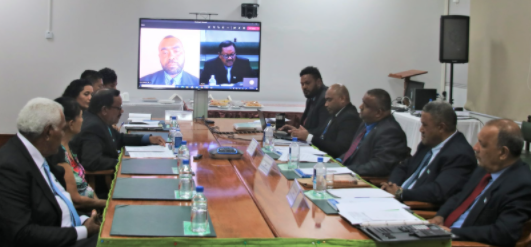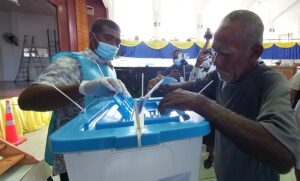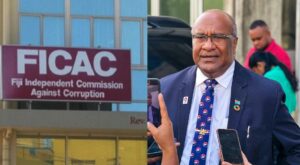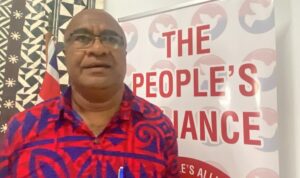Fiji’s Electoral Commission welcomes proposed changes to three of the country’s electoral laws, which incorporates 10 of their 16 recommendations, and called for further amendment to section 7 of the Electoral Act which outlines the powers of the Supervisor of Elections.
Presenting their submission to bills 50 to 52 of 2020 that amends the country’s Electoral Act 2014, Registration of Voters Act 2012 and the Political Parties (Registration, Conduct, Funding and Disclosures) Act 2013 respectively, the EC recommended that section 7 of the Act “be amended and penalty provisions are introduced for any person or entity, except the Courts, for interfering or attempting to interfere with, or directing or attempting to direct the SoE and the Electoral Commission in the performance of the functions of the SoE or the Electoral Commission.”
The EC said the proposed changes will enhance transparency in election management and “further strengthen the electoral system”.
They also welcomed provisions allowing electoral authorities to take action on the publication of false election information and the requirement for candidates to file disclosures not only before election as the case has been, but also after election.
In their submission, the EC also outlined how the proposed changes addresses 10 recommendations they had outlined in a joint report with the SoE in 2018 which include restrictions on the use of state resources in election campaigns. In the joint report released in 2018, the EC and SOE also recommended that the EC is empowered to preside over political parties’ disputes and whose decisions are not open to further review or appeal by an outside party including the court.
EC on how the proposed changes address 10 of their 16 recommendations
1. Voter Lists
The Electoral Commission had recommended that the law is amended to require the FEO to publish provisional voter lists at-least 18 months before the first date the writ can be issued.
Section 40 (8) of the Electoral Act is being amended to require that the provisional Voter List is published annually on or before 30 September every year.
“It is the Electoral Commission’s view that this amendment will allow Political parties to work with the FEO to verify and update the voter lists.”
2. Polling Venues
The Electoral Commission recommended that the law is amended so that the FEO proposes the full list of polling venues for the next election at-least 2 years prior to the first date the writ can be issued.
Section 41 (7) now requires the SoE to identify the physical locations of all polling venues and submit the list of all such venues to the Electoral Commission for approval by 30 June every year. The section 41(8) requires the Electoral Commission to publish the approved list of venues within 30 days of receipt of the list by the SoE.
“This amendment provides the SoE with an approved list of venues to register voters during the election cycle. Political parties will also have a conclusive idea on the number of venues on an annual basis.”
3. Overseas Voters
The Electoral Commission recommended that a polling arrangement is made for voters, who had registered overseas and are in Fiji but did not apply for postal voting, to be able to vote.
Section 41(9) now allows the Supervisor of elections to establish a polling venue in Suva for voters who are registered overseas but are not postal voters to attend to cast their vote and special procedures for the conduct of polling at such polling stations as approved by the Electoral Commission.
“The introduction of this provision allows the FEO to facilitate franchise for voters who may have travelled to Fiji after the Writ to be able to vote. It would also allow any voter that may have missed the deadline for postal voting to travel to Fiji and cast their vote.”
4. Voter Instruction Booklet
The Electoral Commission and both the MOG from 2014 to 2018 had recommended that the National Candidate’s list that is given to every voter when they come to vote should contain political party information. In the Joint Report, the Electoral Commission suggested that the candidates of the parties are listed according to their party. The MOG had recommended that the restrictions on Party identification in the National Candidates List is removed.
Section 36(6) has removed the restriction on political party identification and it now allows the SoE to determine whether it contains the Political Party name or Symbol or any other information as the SoE approves.
“This amendment by Parliament will allow a voter to identify their candidate by the Party. Since nominations in Fiji are by Party Lists, and also considering that the electoral system is based on parties, having the symbols or names of parties on the National Candidates list will make the process more consistent.”
5. Definition of Campaign Period
The Electoral Commission recommended that the campaign period is defined in the law for effective monitoring and implementation of the laws. MOG had recommended that the law should clarify the start and finish of the campaign period.
Section 109A has been insert in the law and it clearly defines the campaign period as starting not earlier than 30 days before the completion of 3 years 6 months from the first sitting of parliament after the last General Election and ends no later than 48 hours prior to the date of the General Election.
“It is the view of the Electoral Commission that this is essential amendment will clarify Campaign laws and the enforcement of the rules relating to campaign. The setting of a proper timeframe also allows all stakeholders to prepare for the election. “
6. Use of State Resources
It is necessary to prohibit the use of state resources in the use of Campaign.
Section 113(4A) makes it unlawful to use Government Vehicles to conduct campaign.
The Electoral Commission notes that in 2018, the media highlighted one candidate who went in his official vehicle to campaign in Cunningham. The change in the law is welcome particularly in terms of levelling the playing field.
7. Enforcement of Blackout Period
The Electoral Commission recommended that the law allows powers for the SoE to enforce the Campaign blackout and to allow the SoE to issue directives to remove campaign material that is in breach of the law.
Section 116(4A) authorizes the SoE to remove or to direct any political party, candidate or police officer to remove any material that is in breach of the campaign rules. Section 116(4B) introduces offenses for failure to comply with the directives.
“The Electoral Commission is of the view that it was necessary for practicality sake that the election management body was able to take immediate action to enforce the blackout period. The current amendment will provide the necessary mechanism to protect the voters.”
8. Provisional Results
The Electoral Commission recommended that the Provisional Results for the election are published by the SoE until 7 am on the day following the election. The Commission notes that there are no specific provisions in this regard although the SoE has been releasing provisional results until 7am the day after polling in 2014 and 2018.
Section 102A of the Electoral Act will allow the SoE to publish the provisional results until 7am the day after polling.
“Provisional results are a necessity in developing democracies as it signifies the progress in count and helps to build peace and calm in the stakeholders. These results are normally received through phone or electronically and are intended to be indicatory only.”
9. Final Report on the General Election
The Electoral Commission, considering the experiences in 2014 and 2018, recommended that the final report by the SoE on the General Election is to be due at least 3 months after the General Election.
Section 109 is amended to allow the SoE to provide the final report on the General Election within 3 months after the General Election.
“This amendment facilitates the compilation of the final report after the conclusion of the Petition Period with is 42 days (21 days to file and 21 days for their decision). It was difficult in 2018 for the SoE to compile the final Report while the Election Petitions were in session in court.”
10. Political Party Disputes
The Electoral Commission recommended for Parliament to allow it to mediate or if necessary, arbitrate disputes between political parties.
Section 30A of the Political Parties (Registration, Conduct, Funding and Disclosures) Act has introduced dispute resolution processes in the law. The decision of the Electoral Commission on whether to mediate or arbitrate is final and is not subject to any further appeal or review by any Court, tribunal or any other adjudicating body.
“This critical amendment introduces expeditious dispute resolution mechanisms between political parties. In an election, timelines are essential and taking legal action may not fit within the expected timelines of the election. Proceedings in court may give a desired outcome but the event may have passed its necessity.”









